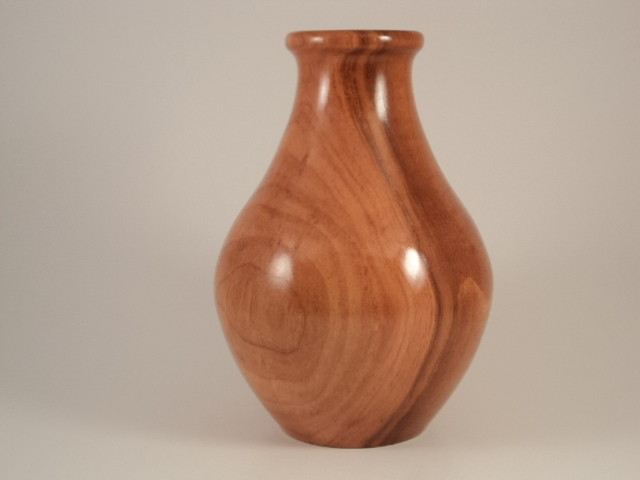Whats Happening In MY Shop
Inside A Tree
I recently made some bowls for a lady from a tree obtained from her childhood home place. It was a Red Oak tree and the bowls turned out great. She wrote a poem and gave it to me. It IS of God from whom the intricate and minute details of a Wooden bowl are provided. It is only my goal to uncover these hidden wonders. Here's the poem Mrs. Sperling wrote.
Inside A Tree
Mother Nature, some may say,
Gives us blessings through the day.
Scenes of beauty, sounds of joy,
Graceful ladies, bare-foot boy.
Rivers flowing, hills of green,
Pop up flowers in between.
Forest homes for deer and squirrel,
Provide food for all the waiting world.
Trees for shelter, warmth, and shade,
All of this our God has made.
He gave us wood, to fill our needs,
So many blessings from God's trees.
The heart, the pulp, the grain, the bark,
Were trusted to my friend called Mark.
Bsperling
1/16/16
If you have a tree from your home place and would like to turn it into a memory that will last for generations, let me know. If you are local I can try to accommodate your needs.
Mark
Turning Cottonwood Burl
This is my first go at Cottonwood. It turned fairly well. Cottonwood, not being as heavy as most hardwoods combined with the burl, made for a few interesting hours of enjoyment. No real surprises, just a slow process. The outcome was absolutely worth the time spent. See these at www.bowlweevilwoodturning.com
Bradford Pear
The Bradford Pear was introduced commercially in 1963 by the USDA. It was suppose to be the perfect ornamental tree but time has proven it to be very susceptible to extreme wind and
ice. The shallow root system coupled with the narrow angle of its branches are two of the main causes. It has a short life span (for a tree) of only 20-30 years. With all this said,
its beautiful white blooms in the spring and scarlet leaves in the fall make it a favorite for many. Sadly this tree fell victim to wind earlier this year. Thanks to my brother
for salvaging some of it for me. This vase and natural edge bowl are available at www.bowlweevilwoodturning.com
Nested Elm Bowls
These nested Elm Bowls were turned from the same tree that fell in my neighbors yard a few weeks ago. The smaller was cored from the larger one. The natural edge (Bark) was left intact and creates an interesting profile. They were nuked in the microwave to dry and doing so they obtain a slightly oval shape. This oval shape is not due to the microblaster , but is a natural occurrence that happens when wood dries.
Salvaging Elm
A couple of weeks ago an Elm tree blew down in my neighbors yard. As we cleaned up the debris my thoughts were about wooden bowls. I had never turned Elm, so off to the computer I went. My searches suggested that it was a fairly good wood for turning so I decided to give it a spin. (That's punny) Elm does turn well and as it turns (punny again) out, it is absolutely beautiful wood. Here are some pictures of the vessel through-out the process. Visit The Bowl Store to see this one and more Elm coming soon. Also keep up with my turning on Facebook.
I also have my turnings on ETSY.
Hickory Yarn Bowl
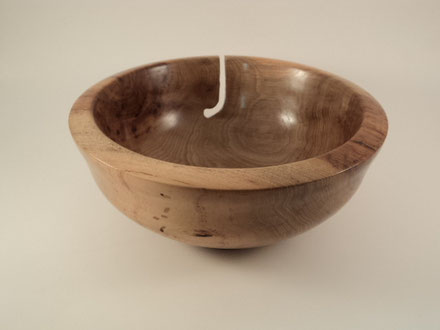
Knit in style with this elegant yarn bowl. If you enjoy knitting a yarn bowl will help with those messy tangles and will keep your yarn in one place. If you have a cat and knit, then a this is a MUST have item. It is made from hickory obtained in southeast Arkansas USA. It coloration is natural and is 9.75" by 3.75".
Stitching up Sycamore
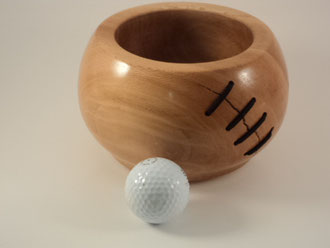
Stitching up sycamore? Yep, that's what I did on this one. Of all the different types of wood I have turned into bowls and vases, sycamore seems to me to be one of the most difficult to get dried to a stable moisture content without a crack or split popping up somewhere. I've started some sycamore bowls that would have been 8 inches tall, but was eventually whittled down to a nice platter because of this. So with this piece I decided not to try to hide or cover up this crack, but instead to embellish it with leather stitches. The stitches have no structural function on this 6.25 inch diameter bowl and one would not want to try to eat a bowl of cereal out of it. Though I've patched and hidden these before, I thought to myself this crack is what the wood wanted to do in its natural state and who am I to try to override one of creations natural occurrences.
Leather laced Walnut Bowl
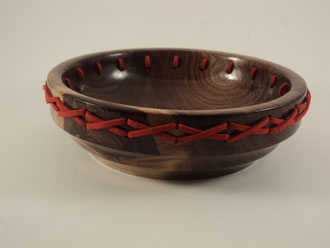
This unique Walnut bowl has holes drilled around the upper section. Through these holes I have laced red leather cord which brings out the beauty of the darker, almost chocolate colored walnut. This bowl is 6.75 inches in diameter and is 2 inches tall. It is available at www.etsy.com/shop/Bowlweevilwoodturnin
Large Cherry Bark Rim, Burl Pot
This large Cherry vase is 14.5 inches in diameter and is 9 inches tall. It is hollowed through a 3.25 in hole that is surrounded with its own natural bark. Each side has its own unique markings given by the greatest creator of all. See www.etsy.com/shop/Bowlweevilwoodturnin for more details.
Large Chinaberry Bowl with Bark edge

This large chinaberry Bowl was oriented so the opening faces the outer parameter of the tree, leaving the bark around the rim. Chinaberry has a beautiful color of brownish orange with the outer ring being bright yellow-greenish. This bowl is 11.5 inches in diameter and stands 6.75 inches tall. See it at www.etsy.com/shop/Bowlweevilwoodturnin
Hickory Natural Edge Bowl
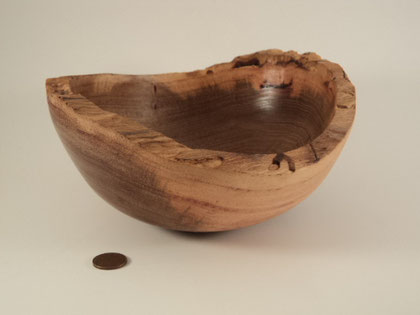
This natural edge Hickory bowl was turned green and left to dry. It finally decided to be an oval bowl with diameters of 7 inches one way and 7.75 inches the other. It stands 3.625 (3 5/8) inches tall. Natural edge means that nothing was done to the rim . Some natural edge bowls have the bark still attached. I removed the bark on this one, as I have done on some in the past, to show what neat designs happen between the bark and the wood. View this and others at www.etsy.com/shop/Bowlweevilwoodturnin
A Hidden Beauty-Chinaberry
The Chinaberry tree. It is native to Asia, but has been planted in the United states for years as a shade and ornamental tree. It has freely escaped its cultivation and to some considered a nuisance tree. Chinaberry is the only tree in North America that is in the Mahogany family. These two bowls are about 5 inches in diameter. They have been highlighted with a small torch which makes the beautiful grain more vivid. At the right angle the wood is almost translucent. I really like to work with chinaberry as the results are very rewarding.
Turned Red Cedar
Red Cedar!! What can you say. It has one of the more unique aromas that can be identified by almost anyone. Its coloration is dazzling and brilliant . I am fortunate to have access to this wood on occasion. I sometimes get the shavings and place them in bowls around my house. These items (although finished) still have a hint of that glorious scent only red cedar can produce. The bowl is 9.5 x 6.5 and the vase is 5.5 diameter by 6.75 inches tall.
Walnut Bowls in southeast Arkansas
Here in southeast Arkansas some woods such as oak, cypress, cedar, hickory, pecan, black gum, and chinaberry, among others, are easily attainable as by-products of new construction or weather related issues. Other trees grow here but are not as readily available. I am fortunate to have friends and neighbors who keep a "watchful eye" for wood that I can turn into bowls. I recently was offered a less procurable tree and quickly jumped at the opportunity. These are my first few attempts to try to show the beauty God created when he made the Walnut tree.
Unique Black Gum Bowl

This Black gum bowl is one my wifes favorites. It is well balanced, handsomely constructed, and features a unique design that ccould be a nice addition to any home decor. Its walls are 1/2 in. thick and has a bit of bark still on the protruding rim. It is 9 inches in diameter and stands 3 inches tall. bowlweevilwoodturning.com
Cypress Enclosed Form
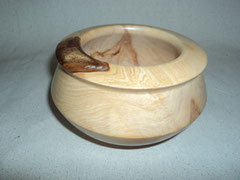
This enclosed Cypress form is 6 inches in diameter and stands 3.5 inches tall. The bald cypress tree can reach heights of 120 feet and a base diameter of 10 feet. It is found along bayous and streams and also around lakes in southern Arkansas. Its natural oil resists rot and insect infestations. It is used widely for outdoor applications, such as fences, siding, flower pots, and tables because of its weather resistance. It also makes a Beautiful bowl.
What is Burl
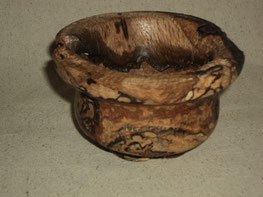
This is a small burl bowl. Burl can come from different parts of a tree. A common place to find burl is a knot or growth on the side of the tree. This growth is not where a limb was cut, it is just a growth. The reason for this whimsicality is largely unknown. It has been told that if one whacks a tree in the fall, a growth will start to form the next spring. It makes for a very interesting grain pattern. This bowl is 4.5 inches in diameter.



























